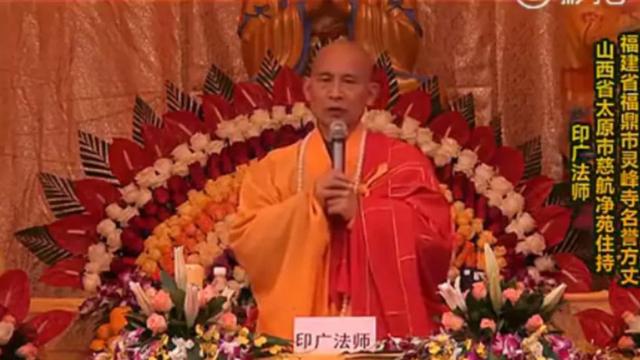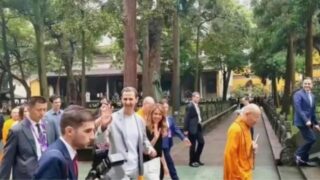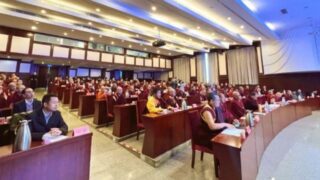The Beijing branch of the Fahua Dojo, led by Venerable Yin Guang, took “Sinicization” to new extremes. It was too much for Chinese netizens.
by Chen Tao


In recent years, as the CCP’s campaign to “Sinicize Buddhism” advances, not only have a large number of Buddhist statues and temples been dismantled and “remodeled,” but government-run temples and Buddhist groups have also become increasingly politicized. “Bitter Winter” has reported on government-run Buddhist temples being forced to perform flag-raising ceremonies, celebrate National Day, and even hold “Party movie classes.” “Sinicization,” as our readers know, does not mean adapting Buddhism to Chinese culture, a process that was completed centuries ago, but making it subservient to the Communist Party ideology.
Recently, “Bitter Winter” learned that a CCP-controlled Buddhist group called the “Fahua Dojo” (法华道场) went even further. Its Beijing branch, the Beijing Fahua Team (北京法华团队), held a cultural performance to celebrate the 102nd anniversary of the founding of CCP, and recorded a video adaptation of the Internationale, promoting “Sinicized Red Buddhism.”
The video received by “Bitter Winter” shows performers from the Beijing Fahua team dressed in Red Army uniforms, or the costumes of “revolutionary youths” in popular “red TV dramas,” waving Communist Party flags and the national flag of the PRC, and singing a song called the “New Internationale,” written by Venerable Yin Guang (印广法师), the leader of the Fahua Dojo. The “New Internationale“ replaces the words “Internationale” of the old song with Xi Jinping’s “Community of Human Destiny” (人类命运共同体), proclaiming that “the community of human destiny will surely be realized,” and calling thus “the most consummate truth” (最圆满的真理). The video also features images of a speech by Xi Jinping, the 20th CCP Congress, and a PLA military parade.


It is worth noting that, unlike some previous performances by China’s Buddhist groups that merely glorified the CCP, the song not only quotes Xi’s sayings, such as “There is no winner in a nuclear war,” and “You are among us, and we are among you,” but also introduces Buddhist concepts and terminology, such as “Perfection” (圆满), “Everything in the world is the result of a single thought” (世间万物皆是一念变现), “The same delusional vision” (同分妄见), and “Self-existent liberation” (自在解脱) into the song, in an apparent attempt to integrate Xi Jinping Thought with Buddhism. It looks as one of the furthest steps taken by the movement of “Sinicization of Buddhism” in recent years.


The source who provided the video told “Bitter Winter” that it was first posted on June 27, 2023, on Bilibili, a video site for young Chinese netizens, by the advertising company Yishang Media (一商传媒) commissioned by the Beijing Fahua team, and that netizens widely mocked the song. Not only liberals considered the song to be a pander to the CCP by politicizing Buddhism, but also Marxist-Leninist netizens considered the lyrics of the song to be inconsistent with the Marxist concept of materialist history, and to promote unorthodox “revisionism.” Following the public outcry over the video, it was quickly deleted, and the Bilibili account of Yishang Media was banned.


The website of Fahua Dojo shows that Venerable Yin Guang was the Vice President of the Buddhist Association of Xiaodian District, Taiyuan City, Shanxi Province, the abbot of Cihang Jinyuan (慈航净苑), Xiaodian District, Taiyuan City, and is now the “Buddhist tutor” of the Buddhist Association of Pizhou City, Jiangsu Province, and preaches the “four loves of red Buddhism,” meaning love for the Party, love for the country, love for the people, and “love for the Buddhism in White Horse Temple,” which is advertised by the local government as the “brand demonstration and practice base for the Sinicization of religion in Pizhou City.”
According to a previous report by RFI, as early as 2016, during his tenure as honorary abbot of Lingfeng Temple in Fuding City, Fujian Province, and abbot of Cihang Jinyuan in Taiyuan City, Shanxi Province, Venerable Yin Guang openly asked his Buddhist followers to “tightly unite around the Party Central Committee headed by Xi Jinping.”


During a Buddhist dharma lecture, he asked the audience to chant after him that, “To be Mao Zedong’s monk, to practice hard work, for the country, for the people, for the public; to be Deng Xiaoping’s monk, to build the dojo, to protect the Buddha, the Dharma and the monks; to be Hu Jintao’s lecturer, to harmonize the theory, to be rounded up and complete and rounded off; to be Lei Feng’s style of Buddha, to give up one’s self for others, at all times, in all ways; to be Amitabha’s pedestrians, to advance in cultivation after attaining enlightenment, to be great in mercy, great in compassion and great in aspiration; to fulfill President Xi’s Chinese Dream, to carry on with the past and move forward, forward and forward.” We can also read these concepts in the posting “The Six Tenets of the Fahua Dojo” on the Fahua Dojo’s website.
“Bitter Winter” also saw more than twenty videos dedicated to the 20th Congress of the CCP on the Fahua Dojo’s website, showing that the group regularly organizes similar events glorifying the CCP.


A Buddhist with a knowledge of the situation told “Bitter Winter” that Venerable Yin Guang is generally regarded in the Buddhist community as a political opportunist who hopes to make a name for himself as a political loyalist. However, our source said, his extremely high-profile approach has had the effect of “high-level blackness” and has aroused concern and resentment about the CCP’s political infiltration into the Buddhist community. This is why even the media controlled by the CCP have now adopted the practice of “cold-treating” the Fahua Dojo under the leadership of Venerable Yin Guang, and not allowing it to gain too much exposure in the government-organized Buddhist events.
“However, as Xi Jinping’s campaign to Sinicize Buddhism advances and government-run Buddhist temples increasingly begin to become openly involved in political activities, this practice at the Fahua Dojo may become more and more mainstream in China’s Buddhist community,” our informant concluded.










